Cutting out all animal products from your diet can make getting enough protein more challenging. In fact, studies show that vegans consume the least protein of all diets. (1) If you’re not getting enough protein or need to eat more to achieve your fitness goals, you may turn to protein powders.
Vegan protein powders are a convenient way to boost protein in your diet. But with so many protein powder options, you may wonder which one is the best plant-based one for you.
Our team of fitness and nutrition experts evaluated and tested over three dozen of the best protein powders. We looked at protein source, ingredients, effectiveness, taste, mixability, nutrition, and price to create a list of the best vegan protein powders to help you in your decision-making process.
Editor’s choice: Transparent Labs
Transparent Labs Vegan Mass Gainer delivers a high-calorie, nutrient-dense formula that’s perfect for fueling your workouts without any unnecessary additives. Providing 52 grams of protein and 730 calories, is designed for those looking to put on true mass.
Medical disclaimer: This article is intended for educational and informational purposes only. It is not intended as a substitute for medical advice. For health advice, contact a licensed healthcare provider.
Our picks for the best vegan protein powder
- Best for muscle gain: Transparent Labs Vegan Mass Gainer
- Best for weight loss: Gainful Customized Protein Powder
- Best vanilla: Ritual Essential Protein Daily Shake
- Best organic: Nutricost Organic Pea Protein Isolate Powder
- Best clean: Ora Organic So Lean & So Clean Plant-Based Superfood Protein
- Best tasting: Legion Athletics Plant+ Protein Powder
- Best chocolate: Transparent Labs 100% Pea Protein Isolate
- Best unflavored: Promix Unflavored Vegan Protein Powder
Compare vegan protein powders
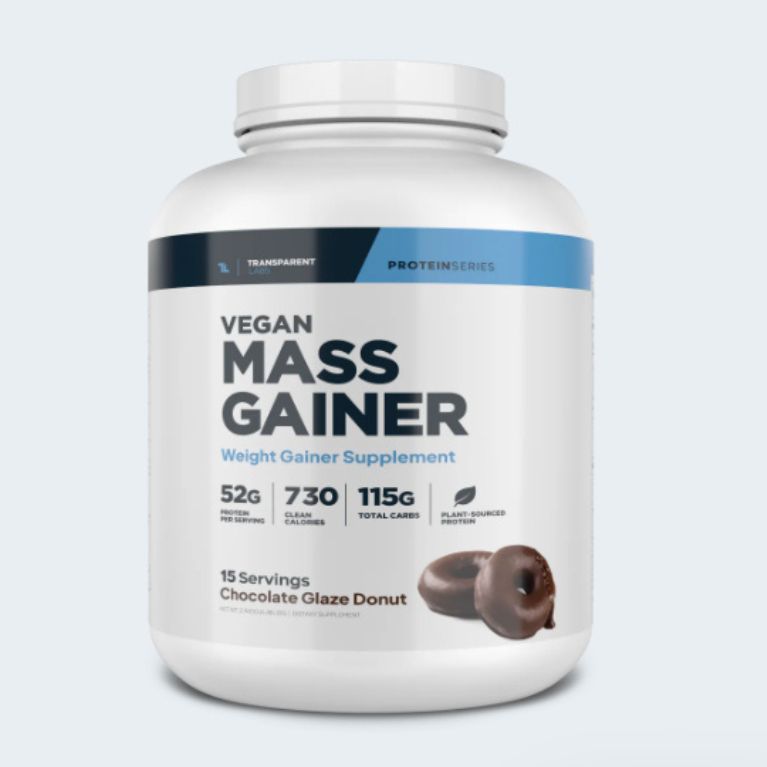
|
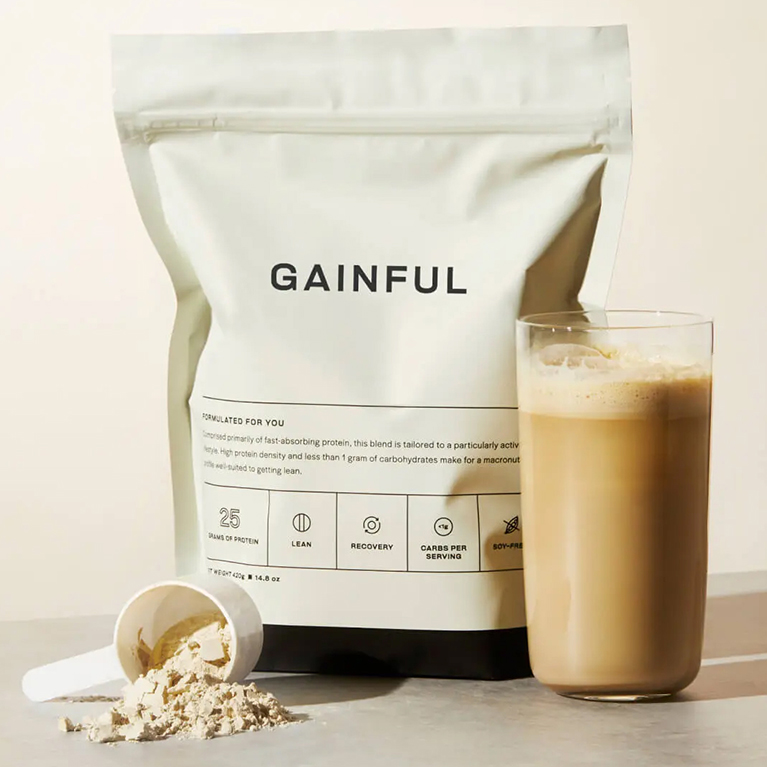
|
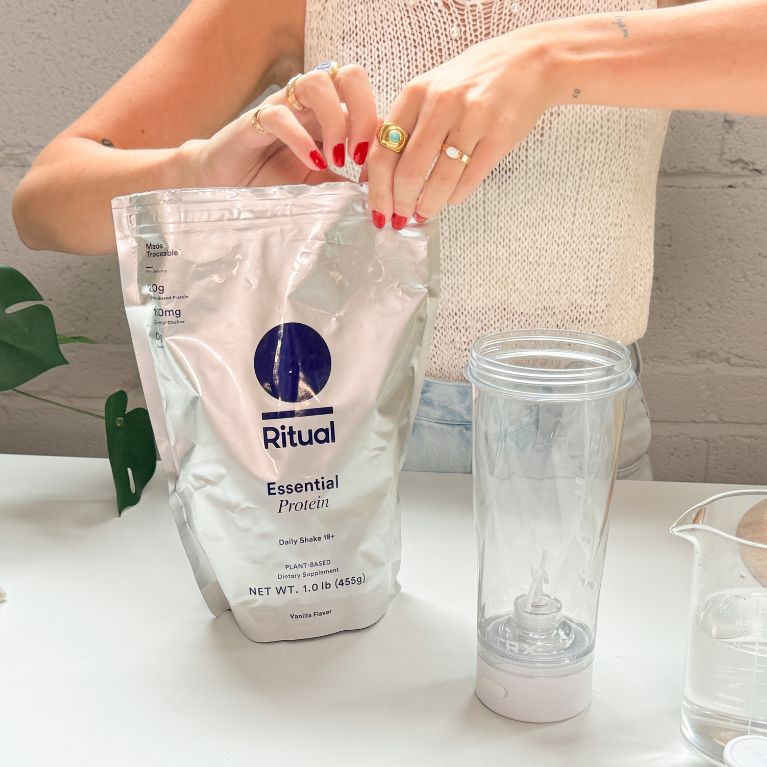
|
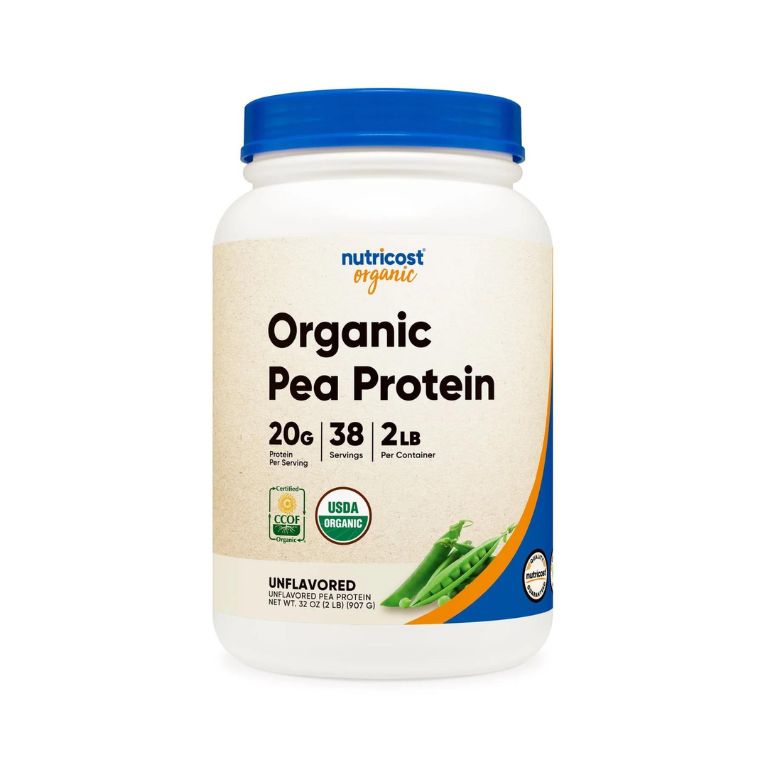
|
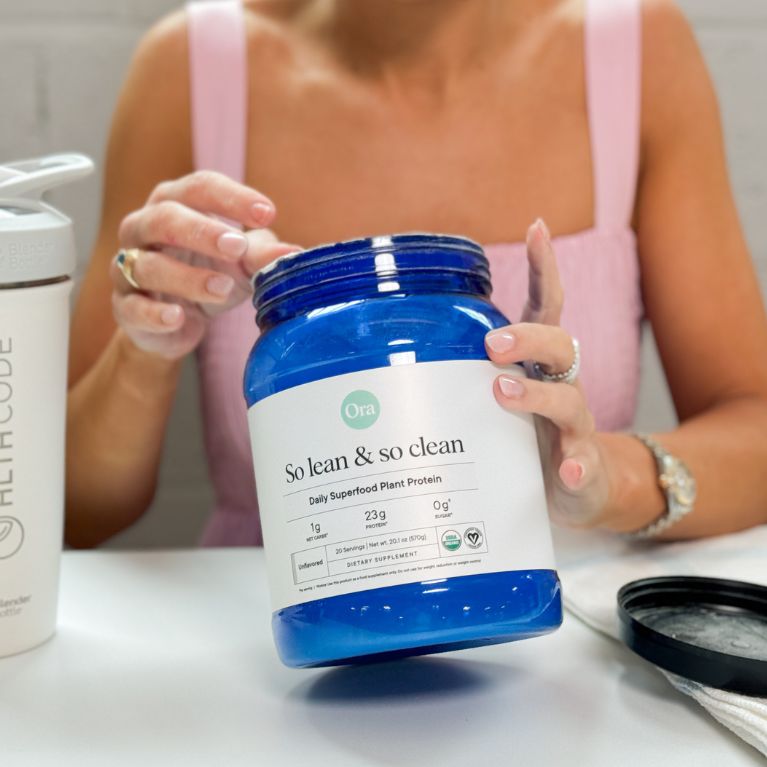
|
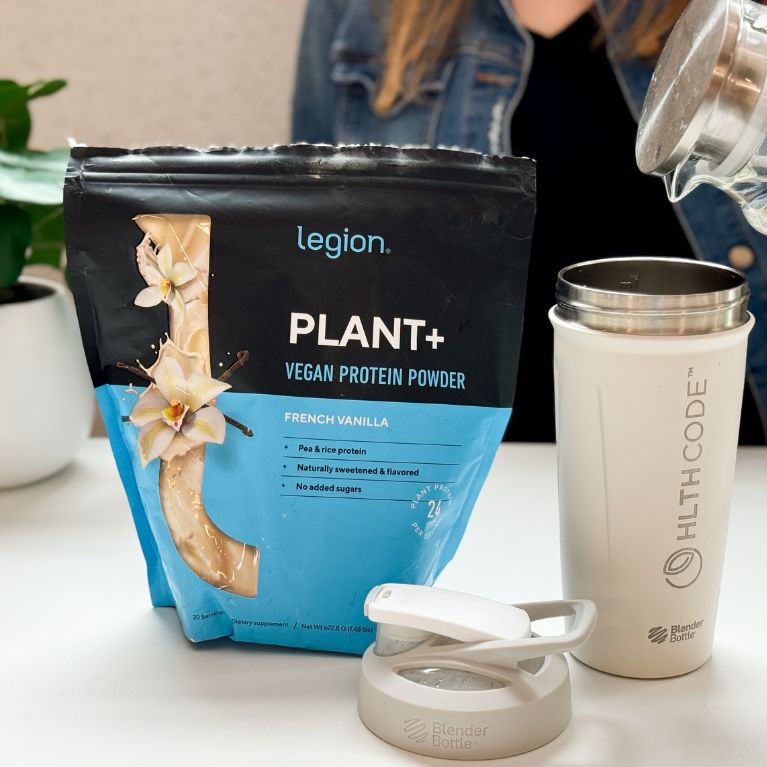
|
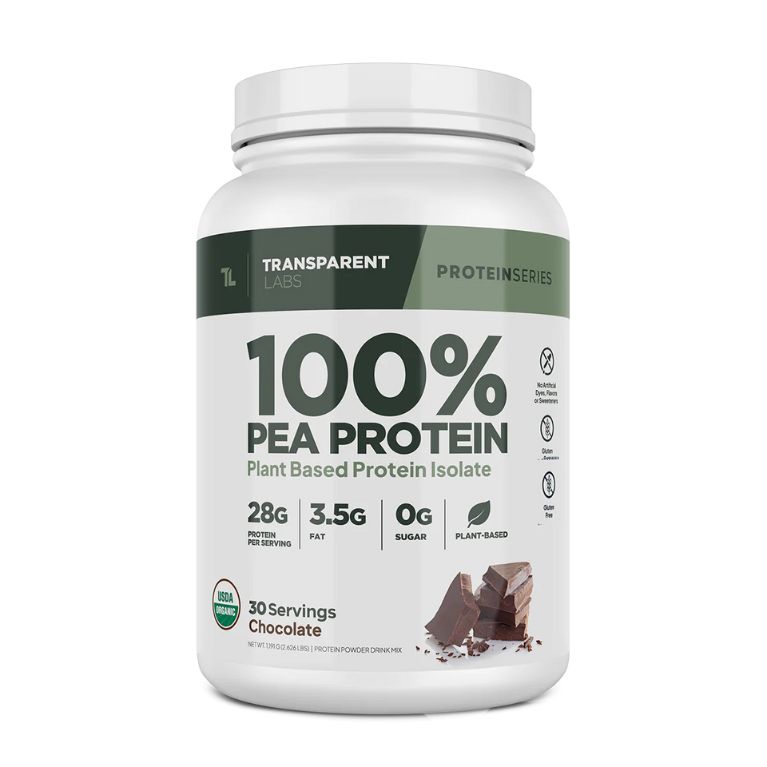
|
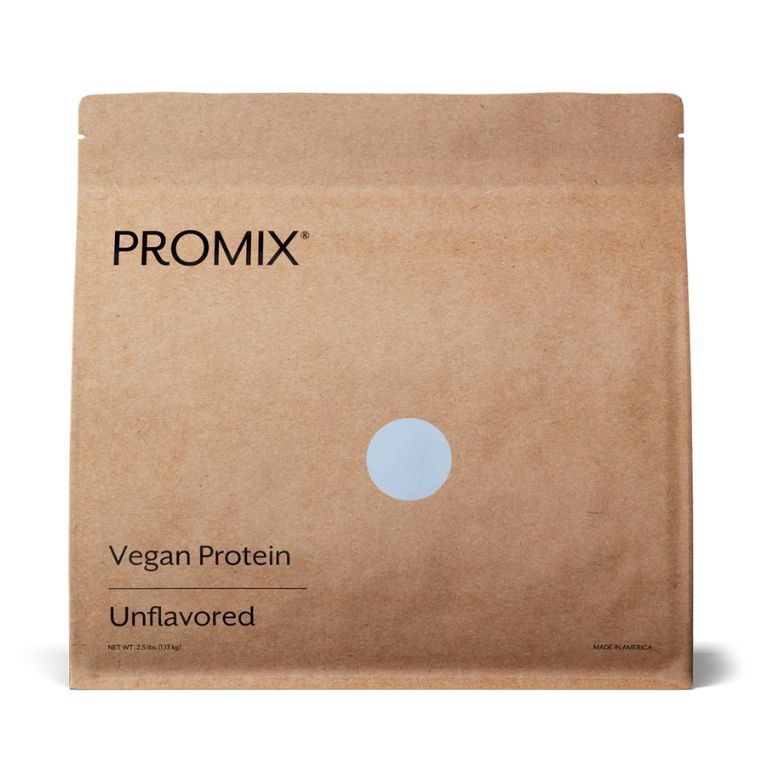
|
|
| Transparent Labs Vegan Mass Gainer | Gainful Customized Protein Powder | Ritual Essential Protein Daily Shake | Nutricost Organic Pea Protein Isolate | Ora Organic So Lean & So Clean Plant-Based Superfood Protein | Legion Athletics Plant+ Protein Powder | Transparent Labs Pea Protein Isolate | Promix Unflavored Vegan Protein Powder | |
| Rating | ||||||||
| Price | $5.33 per serving | $3.21 per serving | $2.67 per serving | $0.87 per serving | $2.00 per serving | $2.50 per serving | $1.67 per serving | $1.16 per serving |
| Protein type | Pea protein isolate | Organic pea protein, organic brown rice protein | Organic pea protein | Organic pea protein isolate | Organic pea protein, organic rice protein, organic sacha inchi, organic sprouted quinoa, organic amaranth | Pea protein isolate, rice protein concentrate | Organic pea protein isolate | Canadian yellow pea protein isolate |
| Flavor options | Chocolate glaze donut, vanilla cupcake | Salted caramel, rich chocolate, cinnamon toast, cookies & cream, caffé mocha, Strawberry cream, chocolate peanut butter, madagascar vanilla | Vanilla | Unflavored, vanilla | Chocolate, vanilla, vanilla chai, unflavored | Dutch chocolate, cinnamon cereal, french vanilla, salted caramel, apple | Chocolate, vanilla | Unflavored, raw chocolate, french vanilla |
Best vegan protein powder for muscle gain: Transparent Labs Vegan Mass Gainer
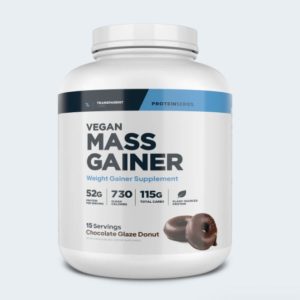

Key product features
What you should know
Transparent Labs Vegan Mass Gainer is a high-protein, high-calorie, plant-based protein powder designed to support weight gain and muscle building.
- This is a high-quality vegan protein powder made with clean ingredients that tastes good and mixes well.
- At $5.33 per serving, Vegan Mass Gainer is the most expensive plant-based protein powder on our list.
- This is a great option for people who follow a vegan diet, or need extra calories and protein to gain muscle.
- This formula contains creatine monohydrate, a supplement that improves exercise performance,supporting gains in muscle and strength when combined with serious training. (2)
Best vegan protein powder for weight loss: Gainful Customized Protein Powder
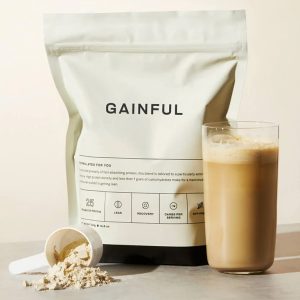

Key product features
What you should know
Gainful is a customizable protein powder that allows you to select your protein type and goal—in this case, plant-based and weight loss—giving you more control over your nutrition. This vegan protein powder also offers single-serve flavor boosts for additional customization.
- Our product testers enjoyed the flavor packets, using a different flavor each time they made a protein shake.
- At $3.21 per serving, Gainful Customized Protein Powder is one of the most expensive vegan protein powders on our list.
- Gainful’s vegan weight loss protein powder is a good option for people following a plant-based diet who want more control over the ingredients in their protein powders.
- A subscription includes access to a registered dietitian.
Best vanilla vegan protein powder: Ritual Essential Daily Shake
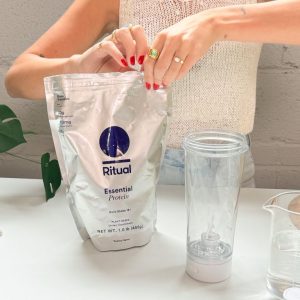

Key product features
What you should know
Ritual Essential Protein Daily Shake is a high-quality vegan protein powder that’s low in carbs and designed to support muscle recovery and growth in active people.
- The Essential Protein Daily Shake contains added L-methionine to improve its amino acid profile for muscle building.
- At $2.67 per serving, Ritual’s vegan protein powder is higher than the standard price.
- This is best suited for active people who want a high-quality vegan protein powder to support weight loss or muscle growth.
- This formula contains traceable ingredients, so you know the source of each ingredient.
Best organic vegan protein powder: Nutricost Organic Pea Protein
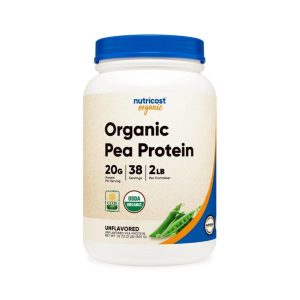

Key product features
What you should know
Nutricost Organic Pea Protein is high in protein and low in fat, carbs, and calories. It’s a simple, but effective vegan protein powder for meeting nutrition needs.
- This formula contains organic pea protein isolate and has a high concentration of plant-based protein.
- Nutricost Organic Pea Protein powder is the least expensive option on our list at $0.87 per serving, making it a great value.
- This is a great option for people who are unable to take other types of protein powders and need a single-ingredient option.
- Nutricost Organic Pea Protein is certified USDA organic.
Best clean vegan protein powder: Ora Organic So Lean & So Clean Plant-Based Superfood Protein
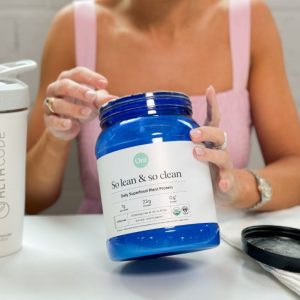

Key product features
What you should know
Ora Organic So Lean & So Clean is a plant-based, nutrient-rich protein powder that packs 22 grams of protein in every serving.
- This formula contains a proprietary protein blend consisting of organic pea protein, organic rice protein, organic sacha inchi, organic sprouted quinoa, and organic amaranth.
- At $2 per serving, Ora Organic So Lean & So Clean Plant-Based Superfood Protein is a little more expensive than average compared to other vegan protein powders.
- So Lean & So Clean is designed for anyone who wants to add more protein and nutrition to their diet.
- This powder has a subtle flavor, so you can easily add it to pancake batter, oatmeal, or smoothies.
Best tasting vegan protein powder: Legion Athletics Plant+ Protein Powder
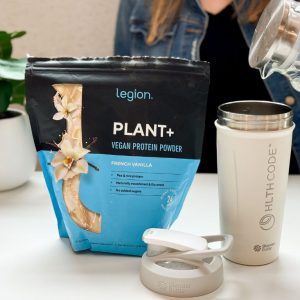

Key product features
What you should know
Legion Athletics Plant+ Protein Powder provides 24-25 grams of high-quality vegan protein from all-natural ingredients that tastes great.
- Our product testers found Plant+ easy to mix with water and plant-milk and enjoyed the fun flavors, though some thought it was too sweet.
- At $2.50 a serving, Legion Athletic Plant+ is priced higher than many other vegan protein powders on our list.
- This is a great option for people who want a protein powder that tastes great and helps them meet their nutrition goals.
- Plant+ from Legion Athletics supplies all the essential amino acids necessary for growing muscle and improving strength.
Best vegan chocolate protein powder: Transparent Labs 100% Pea Protein Isolate Chocolate
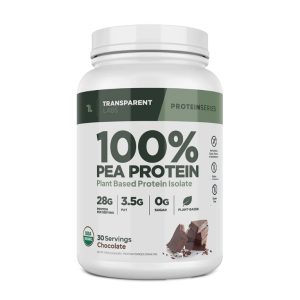

Key product features
What you should know
Transparent Labs 100% Pea Protein Islate is a high-quality vegan protein powder made from organic peas and a rich chocolate taste. One serving provides 28 grams of complete protein, providing almost all of the amino acids necessary for muscle building.
- This vegan protein powder uses 100% organic peas to create a high-quality, pure protein product.
- At $1.67 per serving, the cost of Transparent Labs Pea Protein Isolate is about average.
- This product is a great option for chocolate lovers looking for a high-quality, plant-based protein for building muscle.
- 100% Pea Protein Isolate also comes in a vanilla flavor.
Best unflavored vegan protein powder: Promix Unflavored Vegan Protein Powder
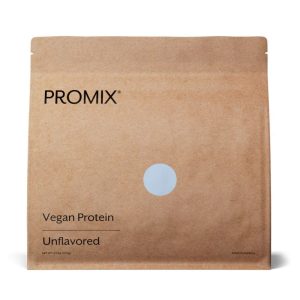

Key product features
What you should know
Promix Unflavored Vegan Protein Powder provides 25 grams of hiqh-quality plant protein that’s easy to digest and absorb.
- This formula contains only two ingredients: organic Canadian yellow pea protein isolate and vitamin B12.
- With a retail price of $1.16 per serving, Promix Unflavored Vegan Protein Powder is a good value. You can save more with a subscription or buying in bulk.
- This is a good option for people who need more protein for repairing and building muscle after a workout.
- This vegan protein powder has zero fat and is very low in carbohydrates.
- Promix vegan protein powder mixes well in liquids, smoothies, and batters for baked goods.
How we test the best vegan and plant-based protein powders
Every plant-based protein powder we review is rated across six primary categories. Each category is assigned a different percentage weight of the total score based on its relative importance when considering whether or not you should purchase a plant-protein product. Plant protein powders can also earn bonus credits that help boost the overall rating for factors such as third-party testing, sustainable packaging, the addition of digestive enzymes, and more.
You can check out our complete plant protein scoring methodology here.
Protein source—40%
The protein source is important because it affects the product’s digestibility, nutrient profile, and environmental impact. We consider the origin of the protein to ensure it meets vegan standards and provides a high-quality, sustainable option.
Here’s what we look for:
- Soy
- Pea
- Brown rice
- Hemp
- lentil
- Chia
- Pumpkin Seed
- Blend
Complete protein—20%
Whether the protein is complete is crucial for determining if it provides all nine essential amino acids needed for muscle repair and overall health. We consider this to ensure that the product can serve as a reliable, sole protein source without requiring additional supplementation.
Macronutrient calories per serving—15%
The balance of macronutrients per serving is important for managing energy levels, weight, and overall nutrition. We consider these calories to evaluate if the product supports specific dietary goals, such as high-protein or low-carb diets.
Our factors in this rating include:
- Calories from protein
- Calories from carbs
- Calories from fats
Total protein per serving—15%
The amount of protein per serving is a key factor in determining the product’s effectiveness in meeting daily protein needs.
Our factors in this rating include:
- 20 grams of protein or less per serving
- 21 to 30 grams of protein per serving
- Over 30 grams of protein per serving
Price per gram of protein—5%
Understanding the cost efficiency is important for those who want to manage their budget while meeting their nutritional needs. We consider the price per gram of protein to compare the value of different products.
These are the ranges we consider:
- $0.30 to $0.50 per gram
- $0.60 to $0.80 per gram
- $0.90+ per gram
Sweeteners—5%
Sweeteners play a significant role in the taste, caloric content, and health impact of the product. We consider the type and amount of sweeteners used to evaluate their impact on flavor, their suitability for low-sugar diets, and any potential health implications.
Here are the common ones we evaluate:
- Sugar
- Dextrose
- Honey, agave
- Stevia
- Maltodextrin
- Erythritol
- Monk fruit
- Sucralose
- Aspartame
- Xylitol, acesulfame
How to choose the best vegan protein powder
You need to consider several factors when choosing the best vegan protein powder for you. These factors include:
Protein source
When selecting a protein powder, you want a supplement with high-quality protein, one that provides all the essential amino acids. A vegan diet omits all animal products, but you can still get high-quality protein from plant sources.
Most vegan protein powders use pea protein. Made from yellow peas, pea protein powders contain all the amino acids. (4,8) Options include pea protein concentrate and pea protein isolate. The isolate undergoes additional processing to remove more fat and carbohydrates, creating a higher concentration of protein in the powder. (8)
Some vegan protein powders use a blend of plant proteins like pea protein and brown rice protein or pea protein and hemp protein. The blended plant proteins improve the amino acid profile of the powders.
Quality and safety
Dietary supplements like vegan protein powders aren’t regulated by the FDA. The FDA doesn’t determine whether the product is safe and effective. It’s up to the manufacturer to follow good manufacturing practices (GMP) to ensure their product is safe, effective, and contains the ingredients listed. (18)
Third-party testing is an independent lab evaluation that checks the quality, purity, and potency of a supplement. Choosing third-party testing doesn’t guarantee a supplement is 100% safe, but it adds an extra layer of protection. (18) Supplement companies may display certifications on their label or provide testing information on their website.
Other ingredients
Your vegan protein powder may have more than just protein. Carefully look at the ingredient list and choose protein powders that include ingredients that fit your needs and goals. You may want to avoid protein powders with added sugar, artificial ingredients, and artificial sweeteners like sucralose and aspartame.
If you have food allergies, read the label to make sure it doesn’t contain your allergen or didn’t potentially come in contact with your allergen during processing.
Taste preferences
Taste matters. You want to enjoy your protein shake so you drink it regularly and get the benefits. Some vegan protein powders come in a variety of fun flavors like cookies and cream and cinnamon toast, while others may only offer traditional flavors like vanilla and chocolate. Choose a flavor that suits your tastes.
Unflavored vegan protein powders are also available and may give you the freedom to create your own flavor using whole foods like fruits, vegetables, and nut butters.
Goals
Your health, nutrition, and fitness goals are important factors to consider when choosing a vegan protein powder. If you want to bulk up and add more muscle, you may need a high-calorie protein powder with added carbs and fat. If you want to lose weight, you may prefer a low-carb, low-fat protein powder.
Budget
Vegan protein powders vary in price, making it easy to find one that fits your budget. But don’t limit yourself to the cheapest choice. Pick the protein powder that offers the best value, one that you like to drink and helps you meet your goals.
Benefits of vegan protein powder
People eating a vegan diet often have a harder time getting the proper amount of protein into their diet compared to meat eaters. While this can impact anyone, vegan athletes, in particular, may want to add a protein powder to their daily routine to help with muscle gain. (3)
Vegan protein powder can also be easier to digest, which is important for people who have gut issues or simply want a healthy gut. (20)
Who should use vegan protein powder?
If you prefer to avoid animal products, vegan protein powder is an excellent alternative that still packs a healthy dose of protein. Vegan protein powder may also be beneficial for people who have digestive issues like IBS and want to try something that won’t exacerbate the condition. (21)
Potential risks of vegan protein powders
While vegan protein powder can be a good alternative to other protein choices like whey protein powder, it can sometimes contain ingredients like soy or gluten that some people are allergic to. (7)
As is the case with any new supplement, it’s a good idea to check with your doctor before adding vegan protein powder to your routine. Although some people can digest vegan protein powders better than whey, others may experience gastrointestinal distress and bloating when making the switch.
FAQs
How much vegan protein powder should I use?
The amount of vegan protein powder you should use depends on your daily protein needs, usual eating habits, and goals. A good protein powder should provide 20 to 30 grams of protein per serving. (22)
What type of vegan protein powder is the best?
After carefully considering all the factors, our top pick for best vegan protein powder is Legion Athletics Plant + Vegan Protein Powder. This protein powder has the best taste, offers many flavor options, and provides 24 to 25 grams of high-quality plant protein per serving. It’s also third-party tested and has no artificial ingredients or added sugar.
What is the easiest vegan protein powder to digest?
According to research, pea protein is the easiest to digest. (17) However, this may vary from person-to-person. The type of vegan protein powder you tolerate best may depend on your health history.
Is vegan protein powder just as good as whey?
While most athletes have similar muscle gains and athletic outcomes when using soy and whey protein powders, other vegan protein powders may not have a one-to-one match up to whey in terms of performance. Small studies suggest higher amounts of protein may bridge the gap between vegan and whey protein when using for athletic performance. (23)
Should I switch to vegan protein powder?
Choosing the right protein powder for you depends largely on what your preferences and goals are. That said, if you are lactose intolerant or have IBS, you may want to switch to a vegan protein powder. Before making this change, make sure to consider what the key ingredients are and make sure you are not allergic to anything in the nutrition list.
These statements have not been evaluated by the Food and Drug Administration. These products are not intended to diagnose, treat, cure, or prevent any diseases.
Our experts
Robert Wildman, Phd, RD, LD, CISSN, FISSN
Dr Robert Wildman (“Dr Rob”) is a globally renowned exercise, fitness, and nutrition expert who speaks around the world on exercise and sport nutrition, and continues to work with professional and elite athletes to achieve their highest level of performance as well as health and fitness. Rob received his PhD from The Ohio State University, earned his MS from Florida State University, and earned his BS from the University of Pittsburgh. He is also a registered and licensed dietitian.
Jessica Coulon
Jessica Coulon is a writer and editor who specializes in fitness, health, nutrition, and science content. Previously, she was an editor for Popular Mechanics and Bicycling, where she covered pro cycling news, wrote how-to guides, and tested all the latest and greatest bike gear. She was also a regular shoe tester and contributor for Runner’s World. You can often find her skiing or riding her mountain bike, and racing with the F1RE female enduro team.
Kelly Uhler
Kelly has a multifaceted background in elder care, health care, and copywriting. She has worked for organizations such as A Place For Mom and Homecare.com, which gave her the opportunity to work closely with families, providing reliable information to help them make informed decisions about their loved one’s health, safety, and quality of life.
Joana Neziri, M.S., NASM CPT
Joana is a writer, editor, and content strategist focusing on nutrition, fitness, and all things health. After earning a master’s degree in business from the University of North Florida, she began a career in research and digital marketing.

Jill Corleone
Registered Dietitian and Health Writer
About Author
Jill’s life has centered around nutrition and fitness for more than two decades. After earning her bachelor of science in nutrition at New York University in Manhattan, Jill went on to complete her internship at the University of Medicine and Dentistry of New Jersey in Newark.
She spent the early part of her career working as a clinical dietitian with a focus on pediatric nutrition. She then transitioned into management. Jill began her career as a freelance writer in 2007 while working as a clinical nutrition manager in Florida. She became a full-time writer in 2010 after the birth of her first child.
Jill has written for numerous publications, including Verywellfit, Diabetes Self-Management, Huffington Post, Livestrong.com, and SFGate.
References
- Bali, A., & Naik, R. (2023). The Impact of a Vegan Diet on Many Aspects of Health: The Overlooked Side of Veganism. Cureus, 15(2), e35148. https://doi.org/10.7759/cureus.35148
- Kreider, R. B., Kalman, D. S., Antonio, J., Ziegenfuss, T. N., Wildman, R., Collins, R., Candow, D. G., Kleiner, S. M., Almada, A. L., & Lopez, H. L. (2017). International Society of Sports Nutrition position stand: safety and efficacy of creatine supplementation in exercise, sport, and medicine. Journal of the International Society of Sports Nutrition, 14, 18. https://doi.org/10.1186/s12970-017-0173-z
- Amatori, S., Callarelli, C., Gobbi, E., Bertuccioli, A., Donati Zeppa, S., Sisti, D., Rocchi, M. B. L., & Perroni, F. (2023). Going Vegan for the Gain: A Cross-Sectional Study of Vegan Diets in Bodybuilders during Different Preparation Phases. International Journal of Environmental Research and Public Health, 20(6), 5187. https://doi.org/10.3390/ijerph20065187
- Babault, N., Païzis, C., Deley, G., Guérin-Deremaux, L., Saniez, M. H., Lefranc-Millot, C., & Allaert, F. A. (2015). Pea proteins oral supplementation promotes muscle thickness gains during resistance training: a double-blind, randomized, Placebo-controlled clinical trial vs. Whey protein. Journal of the International Society of Sports Nutrition, 12(1), 3. https://doi.org/10.1186/s12970-014-0064-5
- Juby, A. G., Blackburn, T. E., & Mager, D. R. (2022). Use of medium chain triglyceride (MCT) oil in subjects with Alzheimer’s disease: A randomized, double-blind, placebo-controlled, crossover study, with an open-label extension. Alzheimer’s & Dementia (New York, N. Y.), 8(1), e12259. https://doi.org/10.1002/trc2.12259
- Moon, J., & Koh, G. (2020). Clinical Evidence and Mechanisms of High-Protein Diet-Induced Weight Loss. Journal of Obesity & Metabolic Syndrome, 29(3), 166–173. https://doi.org/10.7570/jomes20028
- Kalman D. S. (2014). Amino Acid Composition of an Organic Brown Rice Protein Concentrate and Isolate Compared to Soy and Whey Concentrates and Isolates. Foods (Basel, Switzerland), 3(3), 394–402. https://doi.org/10.3390/foods3030394
- Shanthakumar, P., Klepacka, J., Bains, A., Chawla, P., Dhull, S. B., & Najda, A. (2022). The Current Situation of Pea Protein and Its Application in the Food Industry. Molecules (Basel, Switzerland), 27(16), 5354. https://doi.org/10.3390/molecules27165354
- Barber, T. M., Kabisch, S., Pfeiffer, A. F. H., & Weickert, M. O. (2020). The Health Benefits of Dietary Fibre. Nutrients, 12(10), 3209. https://doi.org/10.3390/nu12103209
- Gorissen, S. H. M., Crombag, J. J. R., Senden, J. M. G., Waterval, W. A. H., Bierau, J., Verdijk, L. B., & van Loon, L. J. C. (2018). Protein content and amino acid composition of commercially available plant-based protein isolates. Amino Acids, 50(12), 1685–1695. https://doi.org/10.1007/s00726-018-2640-5
- Office of Dietary Supplements. Choline. Accessed April 27, 2024. https://ods.od.nih.gov/factsheets/Choline-HealthProfessional/
- Vigar, V., Myers, S., Oliver, C., Arellano, J., Robinson, S., & Leifert, C. (2019). A Systematic Review of Organic Versus Conventional Food Consumption: Is There a Measurable Benefit on Human Health?. Nutrients, 12(1), 7. https://doi.org/10.3390/nu12010007
- Academy of Nutrition and Dietetics. Antioxidants: Protecting Healthy Cells. Accessed April 27, 2024. https://www.eatright.org/health/essential-nutrients/vitamins/antioxidants-protecting-healthy-cells
- National Center for Complementary and Integrative Health. Antioxidant supplements. Accessed April 27, 2024. https://www.nccih.nih.gov/health/antioxidant-supplements-what-you-need-to-know
- Saldanha, L. G., Dwyer, J. T., Hardy, C. J., & MacKay, D. J. (2023). Perspectives on the Use of Proprietary Blends in Dietary Supplements. The Journal of Nutrition, 153(5), 1305–1308. https://doi.org/10.1016/j.tjnut.2023.03.035
- Ianiro, G., Pecere, S., Giorgio, V., Gasbarrini, A., & Cammarota, G. (2016). Digestive Enzyme Supplementation in Gastrointestinal Diseases. Current drug metabolism, 17(2), 187–193. https://doi.org/10.2174/138920021702160114150137
- Hertzler SR, Lieblein-Boff JC, Weiler M, Allgeier C. Plant Proteins: Assessing Their Nutritional Quality and Effects on Health and Physical Function. Nutrients. 2020 Nov 30;12(12):3704. doi: 10.3390/nu12123704. PMID: 33266120; PMCID: PMC7760812. https://www.ncbi.nlm.nih.gov/pmc/articles/PMC7760812/
- Office of Dietary Supplements: Dietary supplements: What you need to know. Accessed April 27, 2024. https://ods.od.nih.gov/factsheets/WYNTK-Consumer/
- Office of Dietary Supplements. Vitamin B12. Accessed April 27, 2024. https://ods.od.nih.gov/factsheets/VitaminB12-HealthProfessional/
- Hertzler, S. R., Lieblein-Boff, J. C., Weiler, M., & Allgeier, C. (2020). Plant Proteins: Assessing Their Nutritional Quality and Effects on Health and Physical Function. Nutrients, 12(12), 3704. https://doi.org/10.3390/nu12123704
- National Library of Medicine. Bacillus coagulans. Accessed April 27, 2024. https://medlineplus.gov/druginfo/natural/1185.html
- Jäger, R., Kerksick, C. M., Campbell, B. I., Cribb, P. J., Wells, S. D., Skwiat, T. M., Purpura, M., Ziegenfuss, T. N., Ferrando, A. A., Arent, S. M., Smith-Ryan, A. E., Stout, J. R., Arciero, P. J., Ormsbee, M. J., Taylor, L. W., Wilborn, C. D., Kalman, D. S., Kreider, R. B., Willoughby, D. S., Hoffman, J. R., … Antonio, J. (2017). International Society of Sports Nutrition Position Stand: protein and exercise. Journal of the International Society of Sports Nutrition, 14, 20. https://doi.org/10.1186/s12970-017-0177-8
- Putra, C., Konow, N., Gage, M., York, C.G., & Mangano, K.M. (2021, February 26). Protein Source and Muscle Health in Older Adults: A Literature Review. Nutrients, 13(3):743. https://www.ncbi.nlm.nih.gov/pmc/articles/PMC7996767/
